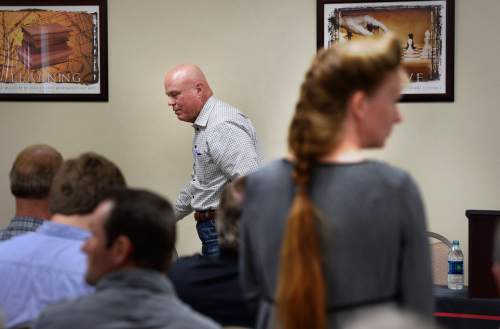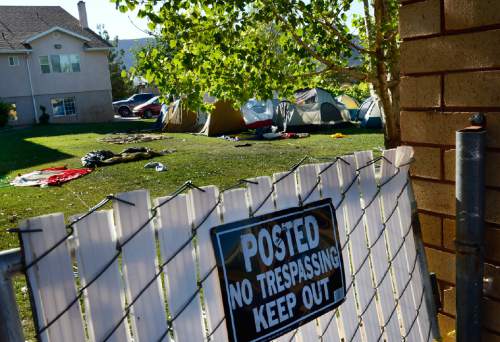This is an archived article that was published on sltrib.com in 2015, and information in the article may be outdated. It is provided only for personal research purposes and may not be reprinted.
Bruce Wisan, the fiduciary in charge of the United Effort Plan, has submitted his annual report on the trust. On the whole, it describes an environment in which Wisan and the trust are asserting more authority in Hildale, Utah, and Colorado City, Ariz., during 2014. But obstacles remain.
The UEP is the trust holding much of the homes and land in Hildale and Colorado City — collectively known as "Short Creek." The trust had been operated by Fundamentalist Church of Jesus Christ of Latter-Day Saints President Warren Jeffs. The state of Utah seized the UEP in 2005 and a judge appointed Wisan to manage it.
Here are some important points from the annual report:
• UEP managers are in stronger positions of power. In 2014, Judge Denise Lindberg, the state court judge who oversees Wisan and the UEP, had enough of people refusing to pay their $100-a-month fees to live in UEP homes. She instructed Wisan to begin eviction proceedings against the debtors. (Even people no longer loyal to Jeffs, have arguments against paying.)
Wisan sent letters demanding payment to 50 homes whose occupants hadn't paid the fees. Sixteen residents then received letters starting eviction proceedings. Residents in all 16 homes moved out, according to the report. A similar process occurred with 30 businesses. Eight of those businesses moved out.
While the report mostly covers 2014, UEP lawyer Jeff Shields said this week that more eviction proceedings have begun in Hildale.
It hasn't just been over the properties where the UEP has exerted more authority. The report discusses how Ron and Jinjer Cooke's victorious lawsuit against the Short Creek governments benefited the UEP, even though the trust was not a party.
The judge in that federal lawsuit issued a 10-year order that the towns not discriminate. Shields this week said Hildale and Colorado City remain uncooperative on a number of issues, including the efforts to subdivide parcels in Colorado City. Shields raised the possibility of filing a motion with the judge in the Cooke case claiming the towns have violated his order.
• The finances are better. But there's still not enough money to pay all the bills, the report says.
The report discusses $2.2 million in property sold in 2014 and early 2015. That money helped pay off the loan the state of Utah issued the UEP.
As for those $100-a-month occupancy fees, how much those collections have improved are in the eye of the beholder. The report says the UEP collected 16 percent of the occupancy fees owed it in 2014.
That's compared to 10 percent in 2014 and 8 percent in 2013.
In all, the UEP says it was owed $4.9 million in occupancy fees at the end of 2014 — an increase of $760,834 in a year.
The report also says the UEP continues to hear that some people loyal to Jeffs are submitting their fees to the FLDS with the assumption the church will forward payment to the UEP. That has not happened.
More people are paying their property taxes, too, the report says. Mohave County, Ariz., was owed about $2.1 million at the end of 2104. That's actually an improvement over previous years.
The taxes in Washington County, Utah, were "essentially current" at the end of the year, the report says. Taxes have been a recurring crisis for the UEP as properties have been days away from the auction block before the taxes have been paid.
The trust still has outstanding debts and is adding to that through lawyers fees from all the litigation involving the UEP.
• Policing problems persist. "There is still too much lawlessness in the communities, including trespassing, harassment, intimidation and the illegal occupation of homes and vacant land ...," the report says.
The report goes on to say that UEP employees inform the towns' marshals when they suspect crimes, and while the Short Creek marshals investigate, "seldom are there any tangible results ..."
The marshals office told the UEP that it filed 97 cases with various prosecutors, but zero charges were filed.
The marshals also have been a big issue in the U.S. Department of Justice lawsuit against the towns.
• The FLDS still don't want to cooperate. Beyond the possible issue with the occupancy fees, the marshals, and Colorado City not wanting to subdivide parcels, the report describes the general obstacles posed by Jeffs followers who don't want to or can't work with the UEP.
"The Fiduciary has been told by individuals that have left the FLDS religion that the FLDS leaders have forbidden its members to work with the Trust...," the report says. "Anyone working with the Trust will apparently lose their membership in the FLDS Church."
The report describes how this animosity is costing the UEP time and money, from having to figure out who is living in each house, to forcing them to pay, to engaging in litigation with the towns over issues that wouldn't happen in other American communities.
Here is the 2013 report and the 2012 report.
If you're reading this on a desktop browser, the report is embedded. Or you can click here to read it.
What else in the report is significant? What were the other important developments in 2014?
Twitter: @natecarlisle





